At the National Day Rally last week, Lee Hsien Loong said, “Do not go on a paper chase for qualifications or degrees, especially if they are not relevant because pathways and opportunities to upgrade and to get better qualifications will remain open throughout your career.“
But do you know this is not the first time Lee Hsien Loong said this? In May last year, The Straits Times quoted him as having said, “polytechnic students have many good options after graduating and need not just aim for a university degree.”
In fact, Lee Hsien Loong was not the only PAP minister to have said this.
National Development Minister Khaw Boon Wan echoed by saying that, “If they cannot find jobs, what is the point? You own a degree, but so what? That you can’t eat it. If that cannot give you a good life, a good job, it is meaningless.”
Minister for Social and Family Development Chan Chun Sing then also said, “It’s not the degree or the diploma… that is most important… What matters most is the training of the mind and the ability to grasp an issue, ask the correct questions, dissect the problem and find the solutions.“
Like many Singaporeans I had heard from, “which government in their right mind will tell their citizens that it is not important to get a degree?”
ASPIRE Committee Recommends Polytechnic and ITE Students to “Deepen Skills”
So, a few days ago, the PAP government released the Applied Study in Polytechnics and ITE Review (ASPIRE) report. Thereport made the following 10 recommendations:
- Strengthen education and career guidance (ECG) efforts in schools, polytechnics and ITE.
- Enhance internships at the polytechnics and ITE.
- Increase Nitec to Higher Nitec progression opportunities so ITE students can deepen their skills.
- Establish polytechnic and ITE leads for each key industry sector to strengthen linkages with industry and help enhance programme offerings.
- Expand online learning opportunities to make it easier for individuals to learn anywhere and anytime.
- Provide more development and support programmes for polytechnic and ITE students to help every enrolled student succeed.
- Launch new programmes that integrate work and study, such as place-and-train programmes, to provide an additional skills-upgrading option for polytechnic and ITE graduates.
- Increase post-diploma Continuing Education and Training (CET) opportunities at our polytechnics to refresh and deepen the skills of polytechnic graduates.
- Support vocation-based deployments during National Service (NS) to help polytechnic and ITE graduates maintain their skills.
- Develop sector-specific skills frameworks and career progression pathways in collaboration with industry to support progression based on industry-relevant skills.
The ASPIRE committee made 10 recommendations but they can be summed up in a few words – the committee wants polytechnic and ITE students to “deepen their skills”.
But do you notice something that is glaringly missing in the report?
SO, AFTER UPGRADING THE SKILLS, WILL STARTING WAGES INCREASE?
Polytechnic and ITE Graduates Still Earn Low Starting Wages
Last year, I wrote about the starting pay of Singaporeans at the different educational levels. According the The Straits Times, “a diploma holder’s average starting salary is $2,000, while that of a degree holder is $3,000“. An ITE student would earn about $1,300. And for someone with a secondary school education of below, the starting pay would be $800 last year or $1,000 (or so) this year.
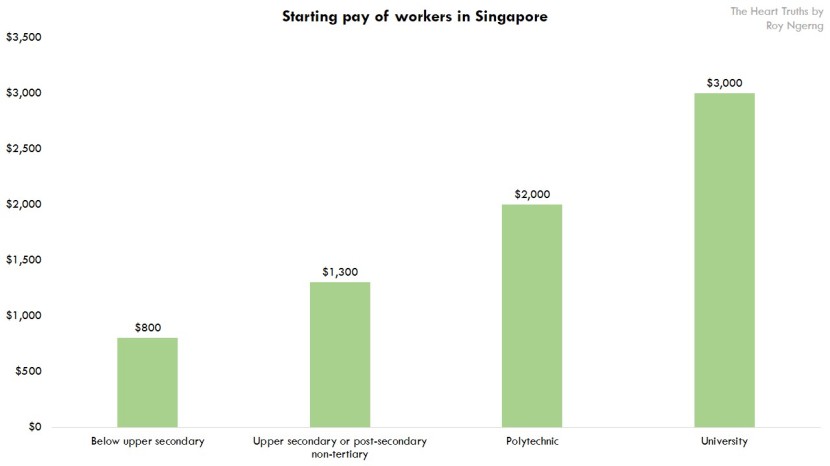
This means that there is a wage gap of $2,000 between the starting pay of someone with a degree and someone who has a secondary school education and below.
And when you compare this with other developed countries, Singapore actually has the largest and most unequal wage gap among the developed countries.

Chart: OECD Indicators Education at a Glance 2013
Now, the above is only for starting salaries.
But according to the Ministry of Manpower, if you look at the wages of polytechnic and ITE graduates (earning around $2,000 and $1,300 respectively), you can see that their wages would remain stagnant or even drop over the course of their work life.
However, for someone with a degree, he/she is likely to see significant increases in their salaries across the course of their work life.

Chart: Report on Wages in Singapore, 2011
Thus this means that over time, someone with a degree might see his/her salary rise to an average of $5,000 or so. However, for the other educational levels, the salary would remain stagnant.

And because of the wider disparity, this means that over time, the wage gap in Singapore would rise dramatically. And when compared with other developed countries, not only is the wage gap the widest, it would also be several times more unequal than the next country with the widest wage disparity.

Chart: OECD Indicators Education at a Glance 2013
Now, note that even though the wage gap is the widest in Singapore, it does not mean that degree holders are paid the highest salaries in Singapore, as compared to other developed countries.
In fact, when you compare Singapore with the other highest-income countries, Singaporeans actually earn the lowest wages.
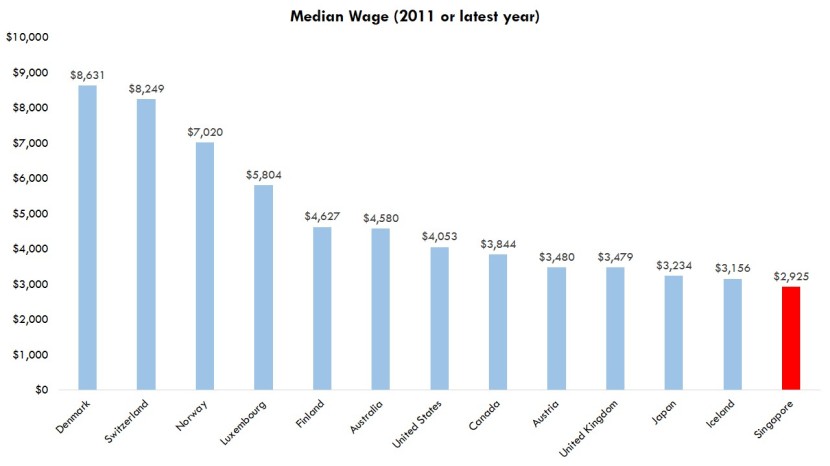
Chart: International Labour Organisation Data collection on wages and income
So, what this means is that degree holders in Singapore are also being shortchanged by the PAP government. So, if degree holders are already being shortchanged, this means that diploma and ITE graduates are even worse off!
Thus even though the ASPIRE committee has made recommendations to “deepen the skills” of polytechnic and ITE graduates, the fact that there was no discussion on wage issues is very problematic.
Now, there is some token news which headlined that, “Outstanding non-graduate teachers could get graduate pay” and “Better career prospects for non-graduates in public service“, but this only refers to any wage increases down the road, such as when “Non-graduate teachers … have demonstrated outstanding performance or have deep experience”, where only then they will be treated as being on par with a degree graduate.
But this is very different from actually increasing the starting salaries of polytechnic and ITE graduates and as long as there is no effort to do this, this would mean that polytechnic and ITE graduates will have to wait several, if not many years, before they are able to see any catch-ups in their salaries. And if they don’t, their salaries will become stagnant or even fall as shown above.
Now, as I have written, at the current CPF interest rates of an average of 3%, a Singaporean would need to earn at least about $2,000 to be able to still buy a flat and retire later on.

And this is only if wages increase by 4% every year. But as you can see above, wages for someone who earns $2,000 is likely to stagnate or drop. This means that if a person wants to earn enough to buy a flat and retire, he/she might even need at least $2,500 or $3,000!
Today, there are 30% of Singaporeans who earn less than $2,000 and 50% of Singaporeans who earn less than $3,000.
Indeed, no wonder Associate Professor Tilak Abeysinghe had calculated that the bottom 30% of households have to spent 105% to 151% of their income, because they simply cannot earn enough to survive.

Similarly, Professor Mukul Asher had also estimated between 27% and 35% of Singaporeans would be living in poverty.

This would mean that Singapore would have the highest poverty rate among the developed countries and one of the highest poverty rate among the Asian countries.

In fact, because of the widest wage disparity, Singapore also has the highest income inequality among the developed countries.
And as I had written before, he PAP government has actually been pushing down the income inequality statistics over each reported period (from 2008 to 2010 to 2013), to create the perception that income inequality is not as high as it actually is in Singapore.

Now, if income inequality is a real problem in Singapore, instead of pretending that income inequality is not a problem by fudging the statistics, shouldn’t there be affirmative action to increase wages at the bottom so as to narrow the wage gap in Singapore?
Shouldn’t the government increase the starting salaries of polytechnic and ITE graduates? So again, why is this missing in the ASPIRE report?
In fact, what is even more disconcerting is that not only is the wage gap the widest in Singapore and not only do Singaporeans earn the lowest wages among the highest-income countries, the rich in Singapore actually earns the highest salaries among the developed countries and one of the highest in the world!

Chart: ECA Global Perspectives National Salary Comparison 2012
When you look at this in perspective, then something doesn’t seem quite right.
- Why are polytechnic and ITE graduates paid the lowest wages when the richest in Singapore pays themselves the highest salaries among the developed countries?
- Why does the PAP government create the largest wage gap in Singapore, among the developed countries?
In fact, from 1995, the income share that goes to the richest 10% in Singapore has risen from 30% to 42% in 2011.
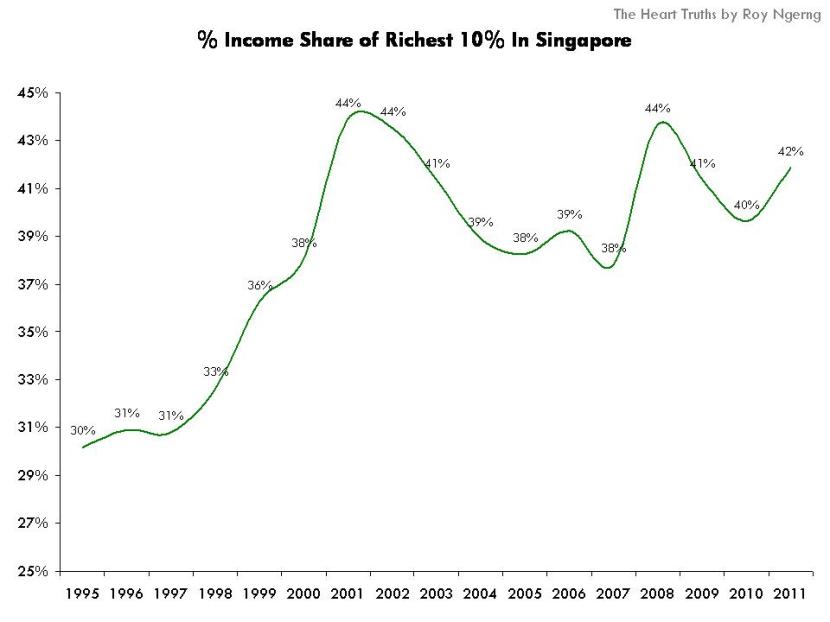
And the richest 10% only started to keep getting richer and richer a year after PAP announced that they would peg the salaries of their own ministers to the rich in 1994.

Thereafter, the richest 10% got richer and richer, and the PAP politicians with it.
Not only that, you can see that every time the income inequality rises in one year, the share of income that goes to the rich will rise in the following year – if so, is the high income inequality in Singapore created by the PAP?

Is the PAP interested in ensuring that wages are kept low for non-degree graduates, so that only their cronies can get ahead?
Perhaps it would become clearer when we know that Singapore is actually ranked 5th on The Economist’s crony capitalism index, where it is the 5th easiest for someone to get rich in Singapore if they are affiliated to the PAP.

Now, the very idea of education is to also improve social mobility. But because Singapore has the income inequality among the developed countries, we thus have one of the lowest social mobilities among the developed countries.

So, it is quite clear that as long as the government does not want to actually improve the lot of polytechnic and ITE graduates by actually increasing their wages, no matter what changes the PAP wants to hoodwink Singaporeans with, the end result is that for polytechnic and ITE students, they will continue to be marginalised by the PAP’s policies and it would be difficult for them to move up the social and economic ladder.
In fact, back to the question – which government would encourage its citizens not to get a degree?
As I have written, when you compare Singapore with the other countries, the number of students who enter public universities in Singapore is comparatively lower than other developed countries.

Chart: Report of the Committee on University Education Pathways Beyond 2015 (CUEP)
Now, when you look at the Finnish education system for example, for students who choose to study diplomas or vocational institutions (similar to ITE), they can continue to proceed to study polytechnic degrees and even polytechnic master’s degrees.
So, instead of telling you that some people do not like to study academically and thus should not go to a university, the Finnish government actually does it differently and sets up universities that cater to vocational needs, so that all its citizens have an equal opportunity to pursue a degree education, in spite of their academic inclinations.
But when we look back at Singapore and realise how Singaporeans have to pay the second most expensive university tuition fees in the world, this again becomes highly problematic. Where is the equality? Where the poorest families can hardly afford to survive, how can they afford to send their children to university? Is university education being kept to the confines of a self-serving elite who wants to keep a degree education a pedigree for their kind?
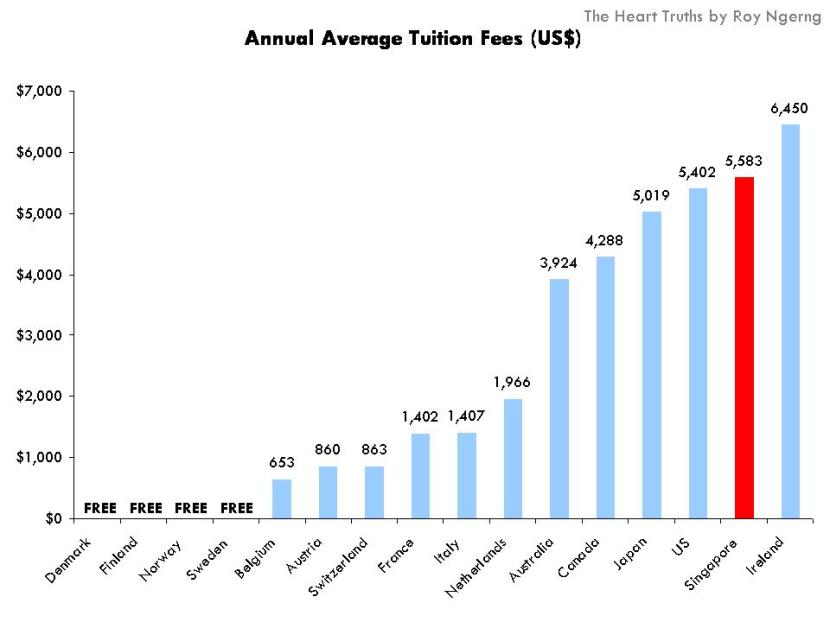
Not only that, the PAP government would rather give more than 50% of international students scholarships, but would only give 6% of local students (including PRs) scholarships.

With the at least $354 million that the PAP gives to international students to study, and the $451 million surplus that the universities accumulate, this would have very easily allowed all Singaporeans to study in the public universities for free. So, why did the PAP government not want to do so?

Why would the PAP government pay overseas students to get a degree in Singapore but tell Singaporeans that it is not necessary to get a degree?
On top of that, in the agreement that the PAP government has signed with the Indian government, it allows the free-flow of workers from India into Singapore, without any protection for Singaporean workers. It also allows their spouses to freely come to Singapore to work. Does the PAP government also sign such an agreement with other countries to allow workers to come in freely to work as well?


If so, does this explain why the unemployment among degree holders have been going up, because of competition from foreign degrees?

Chart: World Development Indicators
Does this thus explain why the PAP government suddenly wants to encourage Singaporeans to think that it is not necessary to get a degree?
You can see that the number of migrants coming into Singapore started spiking up over the last decade.
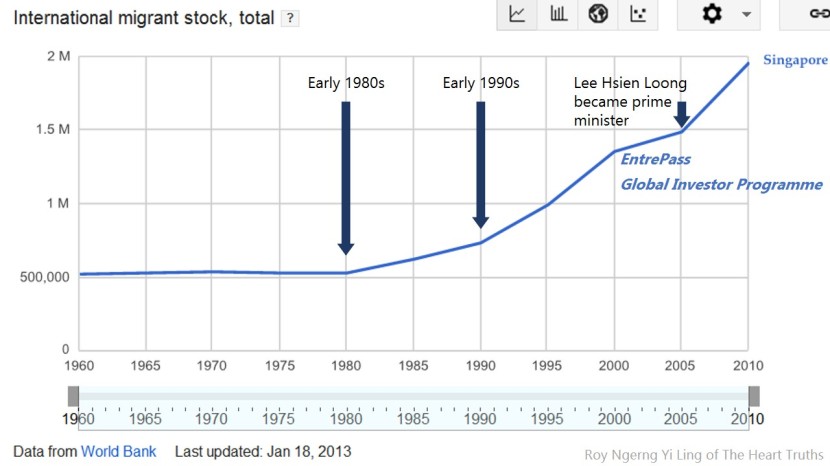
And when the number of migrants coming into Singapore increased, so did the number of Singaporeans who earn less than $1,000.

In fact, it becomes clearer when you look at the proportion of Singaporeans who earn less than $1,000 – it started spiking up in 2004, when the floodgates were opened.

It is thus clear that because of the PAP government’s lax labour policies and unequal wage policies, this has caused a wage depression for the lowest-wage workers.
Has the PAP’s lax labour policies also contributed to the overflow of degree holders into Singapore, which compete with Singaporeans for jobs, and thus the PAP’s sudden about turn to encourage Singaporeans to believe that degrees are not important?
Thus when you look at it as a whole, exactly why does the PAP government suddenly want to encourage Singaporeans to believe that degrees are not important? Doesn’t this fly in the face of logic for a country which wants to advance into the knowledge economy?
Also, even if the government claims that some students might not be academically inclined and should thus go the polytechnic or ITE route, can the government not create polytechnic universities, as the examples of other countries have shown, so that Singaporeans can also receive a university education and get higher pay as well?
In addition, in spite of the government’s changes to the education system, they still have not made affirmative plans to increase the starting salaries of polytechnic and ITE graduates. If the government believes that they do not need a degree and yet it is clear that without a degree, a worker would be stuck with low pay, then shouldn’t the government also increase their starting salaries to account for this?
Otherwise, why stop Singaporeans from getting a university education, when they would otherwise not be able to earn enough to survive in Singapore?
The PAP government’s sudden announcement, with no head or tail, shows a lack of strategic vision as to how they want to shape the education system in Singapore. Why dissuade the pursuit of a university education if we want to advance into a knowledge economy? Why continue to pay low salaries to our polytechnic and ITE graduates, if we do not want them to pursue a university education?
What exactly is on the minds of the PAP government? What exactly are their real intentions behind dissuading Singaporeans from getting a university education? It simply doesn’t make sense. Or is this a knee-jerk response to bad policy planning (as has been shown above with the influx of migrants which depressed wages and increased unemployment, and the agreement with India and the lack of labour protection)?
Or is there an elite agenda to all these?
If so, we can be reminded by what the Vice-Principal of Jurong West Secondary School Pushparani Nadarajah had said that, “How many of our leaders and top officers who say that every school is a good school put their children in ordinary schools near their home? (Only) until they actually do so are parents going to buy (it).“
Indeed, the PAP government might want Singaporeans to believe that Singaporeans do not need a university education, but how many of them would think that it is OK for their children not to go to universities?
If not, it would be very hypocritical for the PAP government to claim otherwise.
#ReturnOurCPF 4 Protest on 27 September 2014
On 27 September 2014, join us at the Hong Lim Park at 4pm at the #ReturnOurCPF 4 protest. Why has the PAP government depressed the wages of Singaporeans, while raising the cost of living in Singapore? How does the PAP government expect Singaporeans to survive, when they refuse to implement a minimum wage to protect Singaporeans?
Join us at the next protest as we speak up against the low wages and high cost of living in Singapore.
You can join the Facebook event page here.
Also, my first court case will be held on 18 September 2014, at 10.00am. It will be a full-day hearing.
Roy Ngerng
*The writer blogs at http://thehearttruths.com/


